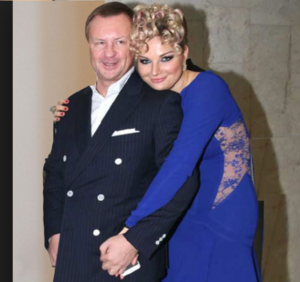
For his part, Voronenkov says he does not believe Ukrainian authorities will send him and his wife back to Russia. “That would spoil Ukraine’s international reputation,
Only a few months ago Denis Voronenkov and Maria Maksakova were two of the brightest stars in Moscow’s political firmament, trying to improve the system from inside, but very much a part of it. They rode in luxurious cars, dined with the Kremlin’s elite at expensive restaurants, vacationed in Paris and Cannes. Both were members of the Russian parliament, the Duma. He was a colonel in the Russian military—a veteran of the military prosecutor’s office—as well. She, a classic Russian beauty, was a diva at the Mariinsky (Kirov) opera. The couple lived the good life in President Vladimir Putin’s Russia. But then the system chewed them up and spat them out.
Now they are whistleblowers—defectors hunted by Russia’s Federal Security Service, the FSB, who have found asylum in Ukraine. And they say they are ready to open up in court about the inner workings of the Putin establishment.
For the moment, at least, they say they do not know about Russia’s dealings with Donald Trump or his associates, even if the information they supply to the Ukrainians might help indirectly to find out more about the many questions surrounding the new American president and his team and their contacts with Russian intelligence.
“Americans should realize that Putin and his guys are convinced that he spins the planet with his feet,” like a soccer ball, Voronenkov told The Daily Beast in an exclusive interview. “The FSB cyber forces are quite powerful globally. Now they do not just listen to you (they listened and recorded all my phone calls for eight years). They also attack other states.”
Col. Voronenkov said he and his wife had no choice but to flee Russia late last year to “defeat the designs of the FSB,” which had begun to investigate them on a number of alleged criminal charges related to a contentious real estate deal. A favorite strategy for silencing suspected troublemakers is to charge them with corruption in a system rife with it.
Nobody stopped the two Duma deputies when they packed and crossed the border in October 2016, which was before their parliamentary immunity officially expired in early December. But they didn’t go to Germany, the country of Masakova’s second citizenship, and not to Israel, where they had gone for their Russian Orthodox Christian wedding. They came to Ukraine to cooperate with a government many in the Kremlin refer to as “the Junta” or “Obama’s puppets.”
Sitting by a fireplace in the lobby of the Hyatt Hotel in the heart of Kiev, Voronenkov spoke emotionally, and constantly checked messages on his cell phone.
“A group of criminals at the FSB offered to let me pay a bribe of $3 million in exchange for closing the case that they fabricated against me,” Voronenkov said. And he was very specific about the man driving the campaign against him: FSB General Oleg Feoktistov.
The ex-deputy insisted that he was not an enemy of Russia, that he loved his country, but he wanted to name names in court. After the Russian government “stole” the oil company Yukos in 2003 and imprisoned the man who built it, Mikhail Khodorkovsky, “Putin gave the entire team of General Feoktistov a green light to rob and persecute businessmen,” Voronenkov told The Daily Beast. Voronenkov claimed that in 2014 the FSB took over businesses and jailed thousands of people for supposed economic crimes. Vornenkov could see a similar fate awaited him. “Only 0.5 percent of Russia’s court decisions are acquittals. Even Stalin had 20 percent. Putin’s system feels more like the Nazis,” he said.
While Russian officials now call Voronenkov a traitor, the ex-deputy has been meeting with Ukraine’s presidential administration and prosecutors, preparing to testify on the treason case of former Ukrainian President Viktor Yanukovych in early March.
“Yanukovych called for the Kremlin to send the army to Ukraine and kill the Ukrainian people. He is a criminal and if Putin backs up Yanukovych, I am not going to back up Putin,” Voronenkov declared.
The ex-president won’t be in the courtroom. He is living in exile in Russia. It is conceivable the hearings will shed light on some of the activities of his associates, including American political advisor Paul Manafort who was, until he resigned last summer, Donald Trump’s campaign chairman. But, again, Vornenkov says he knows nothing about Manafort.
Meanwhile, the news that Ukrainian authorities granted Voronenkov citizenship made many in Ukraine wonder what sort of deal the whistleblower has made with the country’s leadership.
“I want to know why our authorities do not prosecute Voronenkov,” Ukrainian journalist Anastasia Magazova told The Daily Beast with marked frustration. As a member of the Russian parliament he had voted for the Russian annexation of Ukraine’s Crimean Peninsula, she noted, and on Twitter he praised Novorossia, the breakaway state in Eastern Ukraine.
Giving Voronenkov and Maskakov asylum “was a political decision,” Mustafa Nayem, a deputy in Ukraine’s parliament, told The Daily Beast. Voronenkov was seen as a major asset in the upcoming Yanukovych trial—an ex-Russian deputy ready to testify against the Kremlin.
Moscow, in the best NKVD and KGB traditions originally adopted by Vladimir Lenin 100 years ago, has condemned Voronenkov and Masakova as “enemies of the people.”
Russian Deputy Vitaly Milonov, the author of an infamous anti-gay propaganda law, called Masakova “a political prostitute.” The opera- singer-parliament-member spoke strongly against his legislation and in favor of LGBT rights. She was also the only Duma deputy who did not vote for the law that prohibited American families from adopting Russian orphans.
“It is becoming dangerous to even write critical posts on social networks in Russia, but both Voronenkov and Maksakova, very bright public figures in the Russian political elite, criticized certain policies until the system pushed them out,” says Maksakova’s longtime friend, Kremlinologyst Olga Kryshtanovskaya.
But the couple had seemed so very cozy with the top brass at the Kremlin. Not long ago Voronenkov was shaking hands with ideologist of Putin’s Greater Russia policy Vladislav Surkov; the couple also posed for a picture with Sergey Naryshkin, the chief of Russia’s Foreign Intelligence office.
Were they double agents, some in Kiev wondered, sent over for some more complicated role? And even if the Ukrainians can trust them, can they trust the Ukrainians?
“There is no guarantee that our authorities would not give this couple to Russia in some deal or in exchange for prisoners; but for some reason Voronenkov is convinced that he is safe in Ukraine,” Ekaterina Sergatskova, an anchor at the independent Hromadske TV channel told The Daily Beast.
In one recent family portrait Maksakova is proudly hugging her husband and teen son, a student at Suvorov military college. Both men are in their military uniforms. They look like a poster of a patriotic family.
But his former colleague at the Duma, Deputy Milonov said, “He lost his dignity and the right to call himself a Russian officer. This is a betrayal! This man shamed the uniform.”
For his part, Voronenkov says he does not believe Ukrainian authorities will send him and his wife back to Russia. “That would spoil Ukraine’s international reputation,” Voronenkov said.
 Russian Spy Whistleblowers Turn on Putin
Russian Spy Whistleblowers Turn on Putin